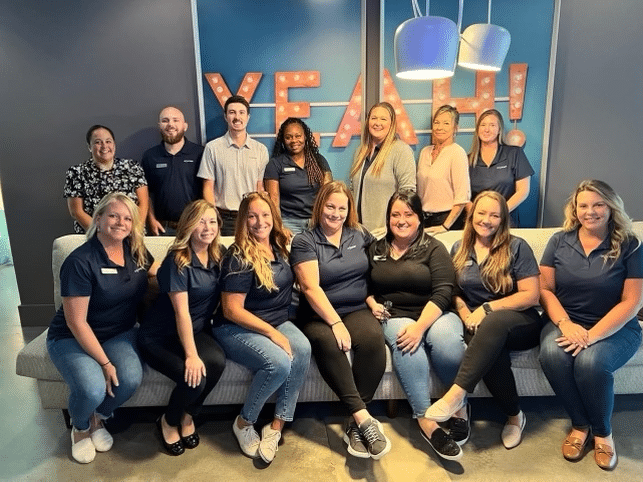When we talk about building an employee-centric culture, what we really mean is focusing on the well-being and success of our employees. This means making sure they feel supported, empowered, and engaged in their work, which, in turn, leads to better productivity, innovation, and, ultimately, business success.
As a property management company that specializes in prioritizing people, we know how important it is to create an environment where employees feel valued. Without a doubt, creating a culture where employees are at the center of everything we do is essential to the success of our company.
For example, even before we transitioned management, our executive leadership team made in-person visits to each property to share the Capital Square (CS) Living story and meet each individual on the team. During all virtual team meetings, new hire orientations, and any time we speak to the teams, we verbalize that we are an “employee-centered company” and ask team members for their feedback – the good, bad, and ugly – because it helps make us better. We are constantly reiterating processes based on team member feedback. When a significant change in process or policy is made based on their feedback, we always credit the team member who helped us reshape that piece of our business.
We have created an environment where our team knows nothing is “off limits.” We need them to raise their concerns or share ideas on how things might be better if they were different. CS Living is a safe space, and employees throughout the organization are aware of this and feel it!
We know that having an employee-centric culture drives customer satisfaction. So, unlike our parent company (Capital Square), where the investor is the sole focus of what they do, we have our team members at the center of everything we do. From our Vision and Mission to our CORE Values, the team member is always first.
We believe that if we pour all our efforts and attention into our team members – giving them the support, tools, and resources they need to succeed – and nurture an environment where employees feel they have a voice that is heard and valued, they will, in turn, create an amazing experience for our residents. In the long run, this comes back to the investors, who will get a much higher ROI than they have in the past.
We also know that employee-centered companies have stronger retention and are more likely to attract top talent. With high job satisfaction rates, our current employees will be more likely to stay with us. Likewise, potential hires will be attracted to a workplace that values employee development, support, and wellness.
Furthermore, an employee-centric culture enhances teamwork, collaboration, and innovation. Our training programs already emphasize these aspects, but they’re amplified in our workplace, which encourages them. Employees who feel heard and valued are more likely to be proactive and contribute new ideas to their teams. They’ll be more likely to feel motivated to improve themselves and their workspace.
When you have an employee-centric culture, you are likely to have a stronger brand. People are increasingly aware of the power of the people behind a business, and a company with a reputation for treating employees well will also be a place where residents feel valued. In addition, an employee-centric culture can provide employees with a better understanding of how their contributions contribute to the larger picture, which leads to a greater sense of pride in the company and its achievements.
Creating an employee-centric culture involves various elements. Below are the top five elements needed to create an employee-centric culture:
- Communication: Communication is one key element to cultivate. It’s important to ensure that communication flows freely, both in terms of hierarchy and between peers. Encourage employee participation and create forums for regular discussions about goals and progress.
- Training and Development: Training and development is another essential element. It provides regular opportunities for employees to expand their skills and knowledge and helps them grow professionally, which, in turn, supports the company in many ways. This also enhances their motivation to continue working for the company, making them feel they have opportunities for personal and professional growth.
- Wellness: Additionally, make sure you support employee wellness, such as healthy eating options, physical exercise programs, and mental health support. When employees feel cared for and supported, they are more likely to believe their needs are taken care of and maintain high productivity levels.
- Recognition: It’s also important to recognize employee contributions regularly. Provide incentives such as awards and bonuses, which demonstrate appreciation for exceptional work. Employee recognition programs that value all types of contributions create a sense of pride, support employee morale, and demonstrate a company culture of teamwork and recognition.
- Listen to Learn: An employee-centric culture is one where employees feel valued. You do this by listening to employee concerns and working toward a solution that benefits everyone. By actively seeking feedback and fostering open communication channels, organizations can cultivate an environment where employees’ voices are heard and acted upon, ultimately leading to increased engagement and satisfaction.
CS Living perfectly exemplifies how building an employee-centric culture drives resident satisfaction. As Mary Kay Ash once said, “People are definitely a company’s greatest asset. It doesn’t make any difference whether the company’s product is cars or cosmetics [or multifamily property management!]. A company is only as good as the people it keeps.”
CS Living is leading by example. If you are ready to put your people first, talk to a Grace Hill expert today about how you can create an employee-centric culture that delivers results.



